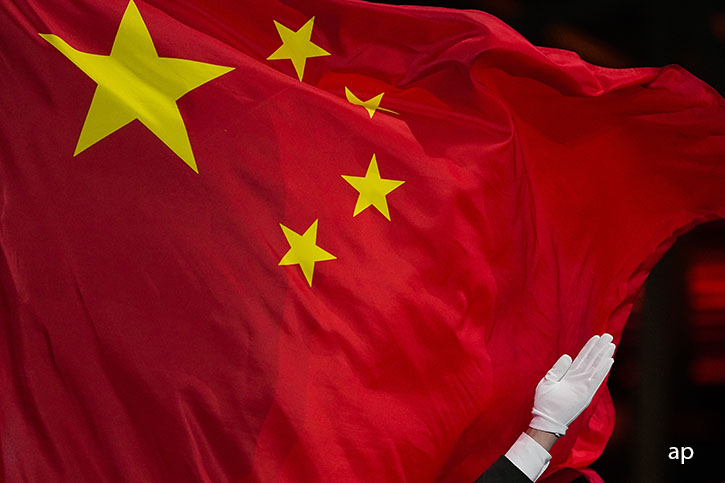
Investors have been reducing their China exposure over the past couple of weeks spooked by a fresh spike in COVID-19 cases in the country, regulatory concerns, and the implications of possible Chinese involvement in the war in Ukraine. The en masse withdrawal of foreign investments has triggered a downdraft for the broader Chinese equities market.
One major headwind for many tech names was the possible delisting of Chinese ADRs from the American indices. The U.S. Senate passed a bill in June 2021 that would allow the U.S. Securities and Exchange Commission (SEC) to suspend companies from trading if they fail to submit their working papers to the Public Company Accounting Oversight Board (PCAOB) for three consecutive years (2021, 2022, and 2023). The U.S. regulator called out five companies that are in the middle of the accounting dispute - fast-food chain operator Yum China (YUMC), wafer processing solution provider ACM Research (ACMR), and bio-pharma firms BeiGene (BGNE), Zai Lab (ZLAB)and HutchMed (HCM), which is a biopharmaceutical producer arm under Hong Kong’s CK Hutchison (00001). The companies have been given time until the end of March to show proof to the authorities that they have complied with the audit requirements, or else they will have to delist from the New York bourse by 2024.
Given the imminent timeline of explanation on compliance and potential delisting, Morningstar analyst Ivan Su sees “a remote chance” that Chinese companies will be delisted from the U.S. stock exchanges because the two countries are actively working to resolve this current challenge. “We started seeing signs of the U.S. and China working together to resolve auditing challenges,” he says, citing the discussion between two countries’ regulators in December. “Progress is getting made, evidenced by CSRC Vice Chairman’s comment on Jan. 29, 2022, which stated that ‘China and the United States were making progress in coordinating regulations governing Chinese companies listed in New York and there could be a ‘positive surprise’ by June or earlier.’”
The downturn in equities has created an opportunity for long-term investors to scoop up dominant Chinese names at outsized discounts. Here are three names to consider:
Chinese e-commerce monolith, Alibaba (BABA) is the world’s largest online and mobile commerce company that operates online marketplaces, including Taobao and Tmall. China commerce retail division accounts for 63% of its revenue, while the rest comes from China commerce wholesale (2%), international retail/wholesale marketplaces (5%/2%), cloud computing (10%), digital media and entertainment platforms (4%), Cainiao logistics services (5%).
While the competition is growing, Alibaba’s leadership position in the e-commerce market remains intact “due to its consumer mind share, vastest range of stock-keeping units, logistics infrastructure, operational expertise, and tools for merchants to manage full product lifecycles,” says a Morningstar equity report.
A Big Data-centric conglomerate, the company possess vast tracts transaction data from its marketplaces and logistics businesses which allows it to move into omnichannel retail, cloud computing, media and entertainment, and online-to-offline services. “A strong network effect allows leading e-commerce players to extend into other growth avenues, and nowhere is that more evident than with Alibaba,” says Morningstar equity analyst, Chelsey Tam, who puts the stock’s fair value at US$188.
Alibaba’s wide economic moat stems of its strong network effect, which it monetizes “better than any other e-commerce platform in China,” Tam says.
Chinese internet giant and is the world's largest video game vendor Tencent (TCEHY) owns a business empire which includes WeChat, QQ, WePay, music streaming, on-demand cloud, and a host of other ventures.
Tencent is arguably the most influential Internet firm in China as one can hardly go by a day without using its products. Tencent has particularly strong presence in the mobile gaming industry. The firm owns some of the world's most popular titles, including Honor of Kings and PUBG Mobile.
“To date, games remain Tencent's primary monetization model--as we estimate more than 40% of the group's operating income comes from this segment,” says a Morningstar equity report, adding that the company has unrivaled access to user data and financial capital that it can leverage to create innovative, high-quality, and long-cycle games with a mobile-first approach.
Apart from games, Tencent boasts a tremendous amount of untapped value in Wechat. The company continues to increase monetization of the social platform through advertising. The platform also “acts as a major gateway for other Internet services (payment, delivery, insurance, etc.) looking to access the 1.2 billion-plus Wechat users,” says Morningstar equity analyst, Su, who pegs the stock’s fair value at US$108.
China’s the largest Internet search engine Baidu (BIDU) has 84% share of the search engine market. The firm generates 62% of revenue from online marketing services from its search engine in 2020. Other than search engine, the technology-driven company has business operations in the fields of artificial intelligence cloud, video streaming, voice recognition technology, and autonomous driving.
Baidu’s online advertising business will continue to be the main source of revenue in the medium term given its dominant market share for search engines. However, it could face long-term challenges for advertising dollars from rivals Tencent and Bytedance.
“In recent years, the firm developed its own ecosystem by creating its own Baidu app that incorporates smart mini-programs to attract organic user growth,” says a Morningstar equity report, noting that the flagship app had reached 580 million monthly active users in second-quarter 2021, increasing 9% year on year.” However, that growth may be plateauing, the report adds.
Baidu is transforming its identity by aggressively investing in AI firms, mainly AI cloud and autonomous driving. “There are encouraging signs of its AI cloud monetization having seen a 75% CAGR from 2018-20, now accounting for 14% of Core revenue in second-quarter 2021,” says Morningstar equity analyst Kai Wang, but warns that despite sharp growth, Baidu could face competition in the cloud from industry leaders Alibaba, Huawei and Tencent, which all have greater market share than Baidu.
Wide-moat Baidu reported a whopping of CNY 33.1 billion fourth-quarter revenue, supported by its newer artificial intelligence and cloud businesses.




















